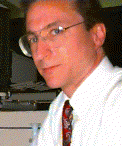


I am currently the Deputy Operations Manager for the Hubble Space Telescope Operations and Ground System Project. I work with a team of engineers, scientists and flight operations controllers to keep the HST satellite running efficiently. There are two parts to the story, the satellite and the ground system. The telescope you've seen. The ground system consists of dozens of computer systems each designed for a special function. Some systems prepare the intricate lists of commands needed to take a single observation. Other systems process, check and display what's happening on HST. Still other systems process the data into the pictures you see. Each system has a dedicated staff of programmers and operators who control the process. Part of my job is to help make all of these systems and people get the job done well.
As for the spacecraft, there are teams of experts in every subsystem. They study the behavior of the satellite to make sure it stays within its normal limits. They analyze and explain any anomalies which occur. They even predict when components may break or should be replaced. Each subsystem effects other subsystems. Part of my job is to help the team work together and consider the interactions.
Every few years a Space Shuttle mission is dedicated to fly to the HST and replace components. Some components have failed and must be replaced. But even more important, better instruments which use the latest technology take the place of older ones. Part of my job is to prepare for and participate as part of the ground crew for that mission.
My career as a civil servant began right out of high school. I worked as an engineering trainee during summer and winter breaks. First I worked for the Rural Electrification Administration in an office which reviewed plans for new power lines. I transferred to the Naval Surface Weapons Center (NSWC) so I could work with electronics. I really enjoyed this work so I accepted a full time job there when I graduated from college. I was given increasing responsibility and very interesting and rewarding electronics design challenges.
I went to classes at night and completed a Masters degree in Engineering Management and requested an assignment to the Naval Sea Systems Command to try out my new skills. That job was fun too but I missed "hands on" design. I was fortunate to get an offer from the Goddard Space Flight Center. Although I knew a little about spacecraft, I knew a lot about telemetry and electronics. I designed systems to process the telemetry data transmitted from spacecraft. The telemetry contains the scientific measurements from instruments onboard. Only recently did I get the opportunity to be involved in the control and monitoring of spacecraft. I'm working with really smart people and learning more each week.
I entered college with 3 potential careers: electronics, psychology, or photography. I started in the electrical engineering program and enrolled in an introductory psychology class. I took several classes in experimental psychology but never switched majors. As for photography, I shot a roll of film a day for 6 months straight for the college yearbook. I got burned out and have only shot a roll or two in the last 15 years. Taking pictures with HST is more fun. I continued through the electrical engineering program because, during my summer job, I could see the work was rewarding. I wanted in. Thinking about it, I got a little of everything (photography, psychology, and electronics). The HST takes great pictures. Understanding people and psychology comes in handy somedays. And of course electronics, which is used in both the satellite and ground system.
The best part about my job is feeling part of something important. I like almost every aspect of science and feel fortunate to be contributing. The worst part of my job is worrying about the political issues. I can work very hard to conquer a technical obstacle. I know that it can be overcome and that the result is worthwhile. Most of the energy expended on political issues is wasted.
As a kid, I can remember being more interested in connecting a battery to a motor from a toy car than in the toy itself. The plastic car hid the guts, it just got in the way of understanding how it worked. I would get old television sets or radios discarded behind the repair store. I didn't know enough to repair them, but I would take them apart and marvel at all the parts. It was interesting to split open capacitors, resistors, inductors, transistors, switches and motors. This practical knowledge helped me later when I learned the theoretical. My parents gave me a multimeter for my 8th grade graduation. I used it to observe the resistance of various resistors, the discharge of various capacitors, and the function of diodes. For electronics, you are fortunate if you can get an experimenter kit. It has the parts, the books, its all planned out and safe.
An engineering or computer science degree is the ticket into this field. I chose electrical engineering because I was thrilled by the technology. I had classmate who were equally thrilled by mechanical engineering or computer science. The course work for these degrees is challenging. Start right now to learn good study habits. Find a quite place to work (no TV or radio), plan your time, study hard (then reward yourself). I guess we've all met someone who thinks studying and being smart isn't cool. Think about that a while. Your smart enough to reach your own conclusion.
There are several people who influenced me. I had a fifth grade science teacher, Mr. Kloepple who introduced us to the scientific method, the periodic table of elements (I still have my hand drawn copy), and basic scientific principals. It was both difficult and exciting at the same time. I had an eighth grade science teacher, Mr. Baley, who emphatically told us "Don't let anyone ever tell you that school isn't hard." I think what he meant was, if you expect school to be easy, you will try to make it easy, you will be annoyed when it takes a little extra. Good mental exercise makes you feel just like physical exercise: tired and strained. If you practice regularly, you get stronger.
My father operated and repaired radar for the U.S. Marines during World War II. He was always helpful in answering my electronics questions. My grandfather was a self taught chemical engineer. He was a great source of encouragement for studying hard and preparing for college.
I have a daughter age 7 and a son age 4. They enjoy swimming, wrestling, and playing with their 17 pound cat "Midnight". My daughter loves to sing and read. My son enjoys building Lego, Tinker Toys and Capsella.
I own a sailboard which I take with me when we vacation at the beach. I am a Maryland certified Emergency Medical Technician (EMT) and an American Red Cross CPR and First Aid Instructor. I enjoy helping others and teaching people how to do the same.

![]()